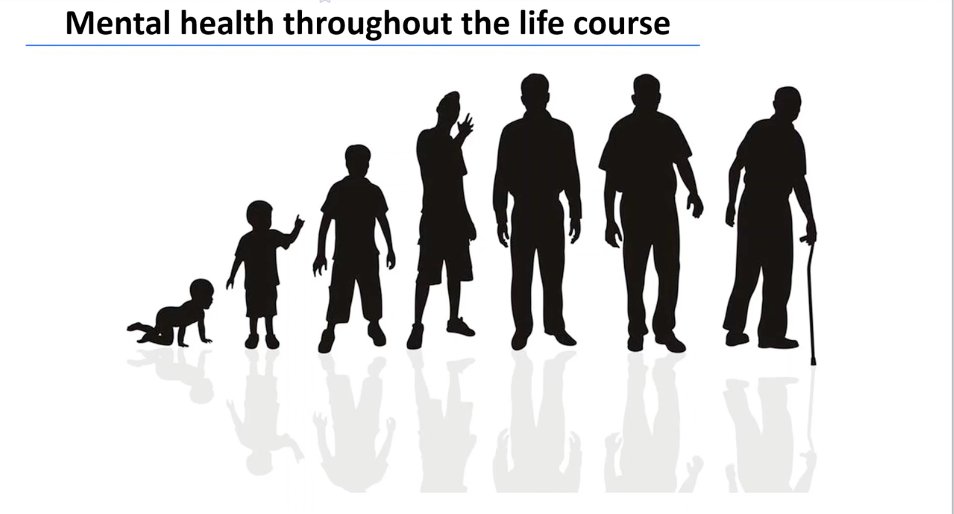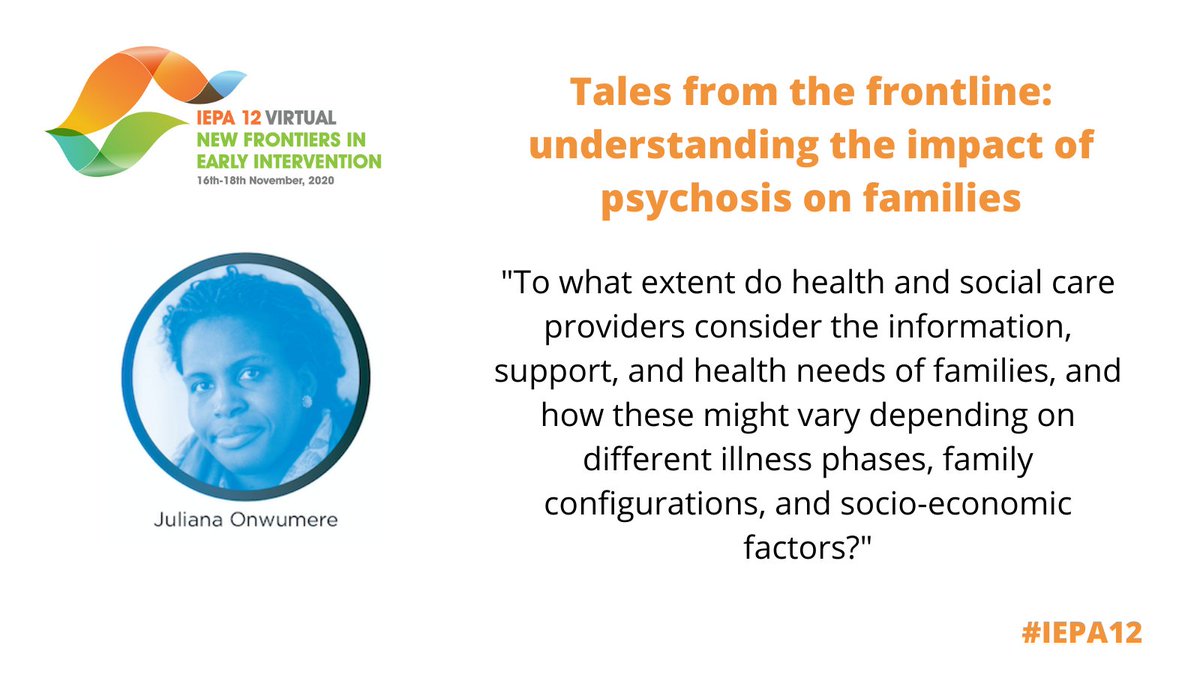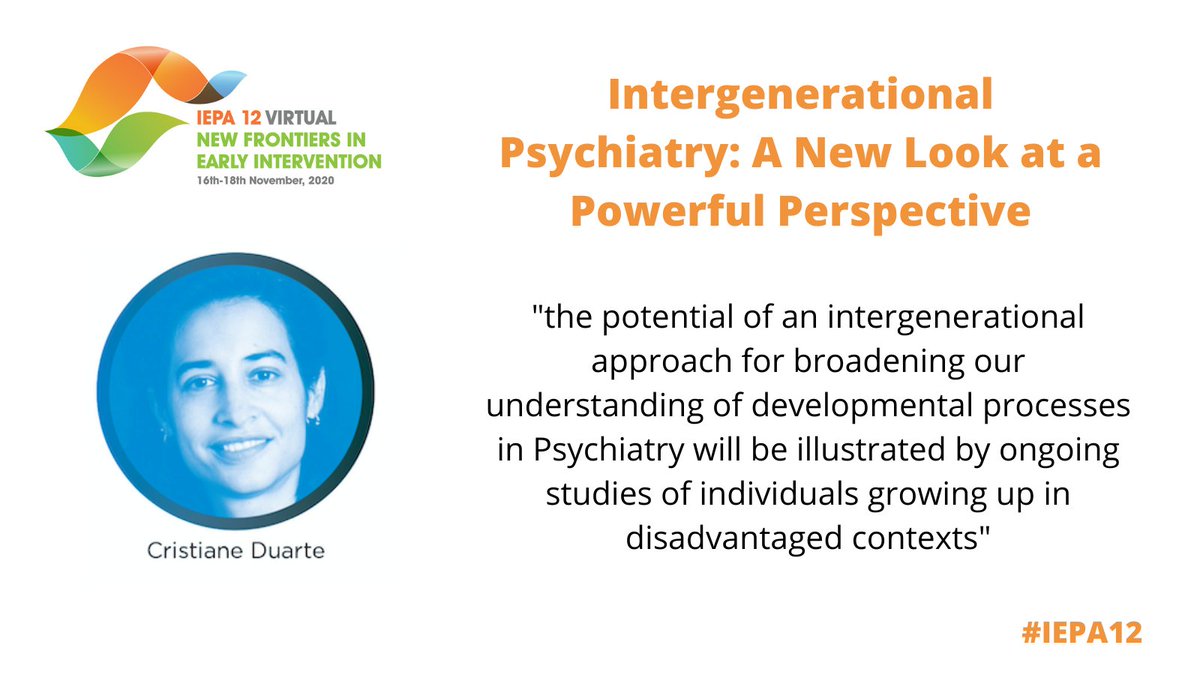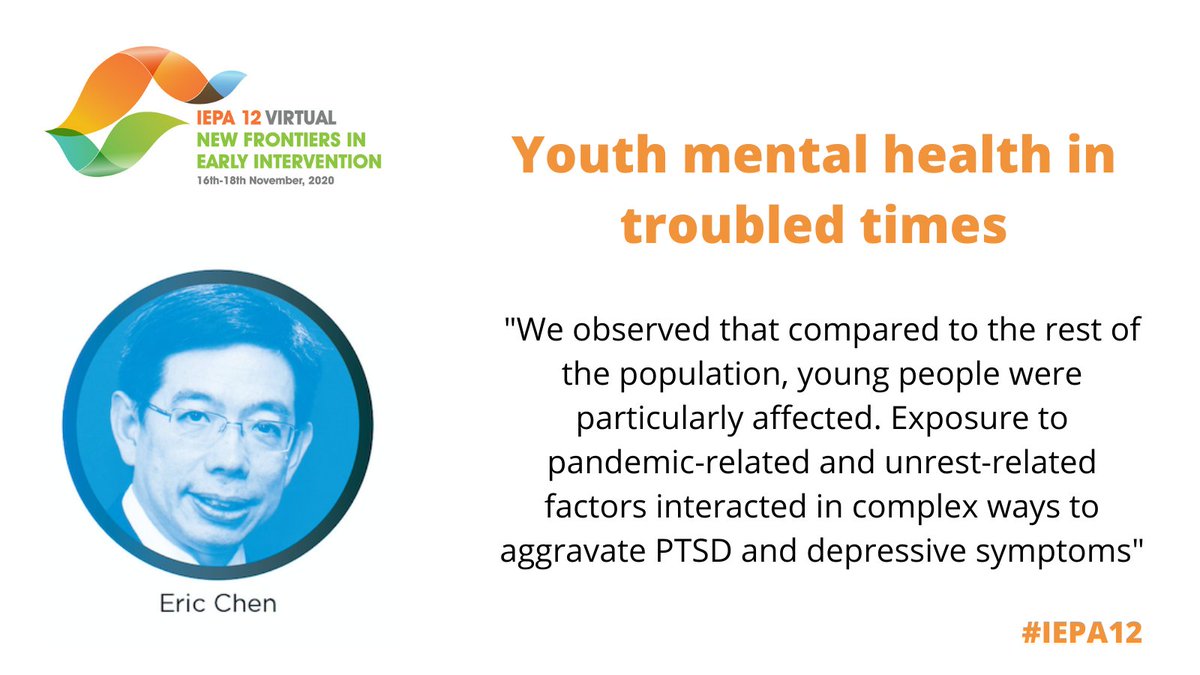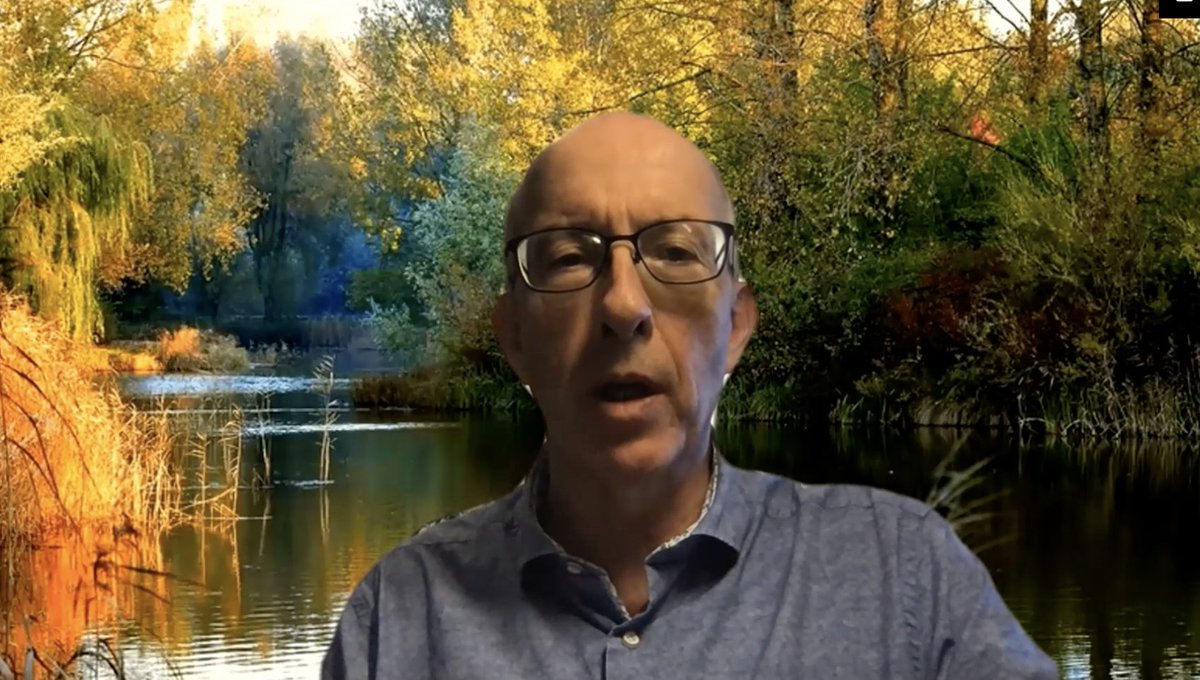
A very warm welcome to the first plenary session of #IEPA12 featuring Prof Patrick McGorry @PatMcGorry from the University of Melbourne: His talk is entitled: “The Next Stage for Early Intervention: Transdiagnostic, Personalized, Universal” 

@PatMcGorry begins by saying that “mental health is more important than ever”. In this talk he will be talking about the transition from early intervention to a transdiagnostic approach based on clinical staging, which has been in development for more than 20 years #IEPA12
Ideas are important, says McGorry, but they need to be carefully stage-managed and implemented. Ideally we'd like to cure psychosis, but in the meantime, “bending the curve” is a good starting point #IEPA12
The first early intervention in psychosis meeting took place in Melbourne in 1996, and this has now developed into a global approach for early intervention in mental health more widely #IEPA12
The @IEPAnetwork is a very large organisation with >7,000 members worldwide, and very diverse (researchers, clinicians & many others), says @PatMcGorry.
#IEPA12
#IEPA12
This is a “spawned a paradigm shift” which has been supported by the Early Intervention in Psychiatry journal
#IEPA12
onlinelibrary.wiley.com/journal/175178…
#IEPA12
onlinelibrary.wiley.com/journal/175178…
The focus of McGorry’s #IEPA12 talk will be:
1. At-risk mental state/Ultra High Risk/Clinical High Risk
2. DUP - time is of the essence
3. Scaling up EIP - why so slow?
4: Youth MH and transdiagnostic EI
1. At-risk mental state/Ultra High Risk/Clinical High Risk
2. DUP - time is of the essence
3. Scaling up EIP - why so slow?
4: Youth MH and transdiagnostic EI
"We know that we can predict transition to psychosis", says @PatMcGorry and quotes a paper by Fusar-Poli et al. (2012) #IEPA12
jamanetwork.com/journals/jamap…
jamanetwork.com/journals/jamap…
The pathways are variable. The transition to sustained psychosis is the one we’re primarily trying to prevent, but there are other pathways that also need our attention. #IEPA12
This approach has not been without detractors, e.g.
Ajnakina 2018 Psych-Med explore "At risk mental state clinics for psychosis"
doi.org/10.1017/S00332…
#IEPA12
Ajnakina 2018 Psych-Med explore "At risk mental state clinics for psychosis"
doi.org/10.1017/S00332…
#IEPA12
McGorry is now talking about the “ground-breaking US led accelerating medicines partnership for schizophrenia”, which he is “proud to be part of” #IEPA12 fnih.org/what-we-do/pro…
It's possible to reduce the risk and delay transition to psychosis by 50% (Van Der Gagg 2013), which is confirmed by a more recent meta-analysis #IEPA12 doi.org/10.1016/j.schr…
McGorry cites the following paper by Devoe et al., exploring interventions and transition in youth at risk of psychosis. CBT is the common effective intervention in many of these studies. #IEPA12 doi.org/10.4088/jcp.17…
Recent McGorry editorial highlighting disagreements in literature: Clinical High Risk for Psychosis—Not Seeing the Trees for the Wood in @JAMAPsych #IEPA12
jamanetwork.com/journals/jamap…
jamanetwork.com/journals/jamap…
To summarise clinical high risk psychosis #IEPA12 
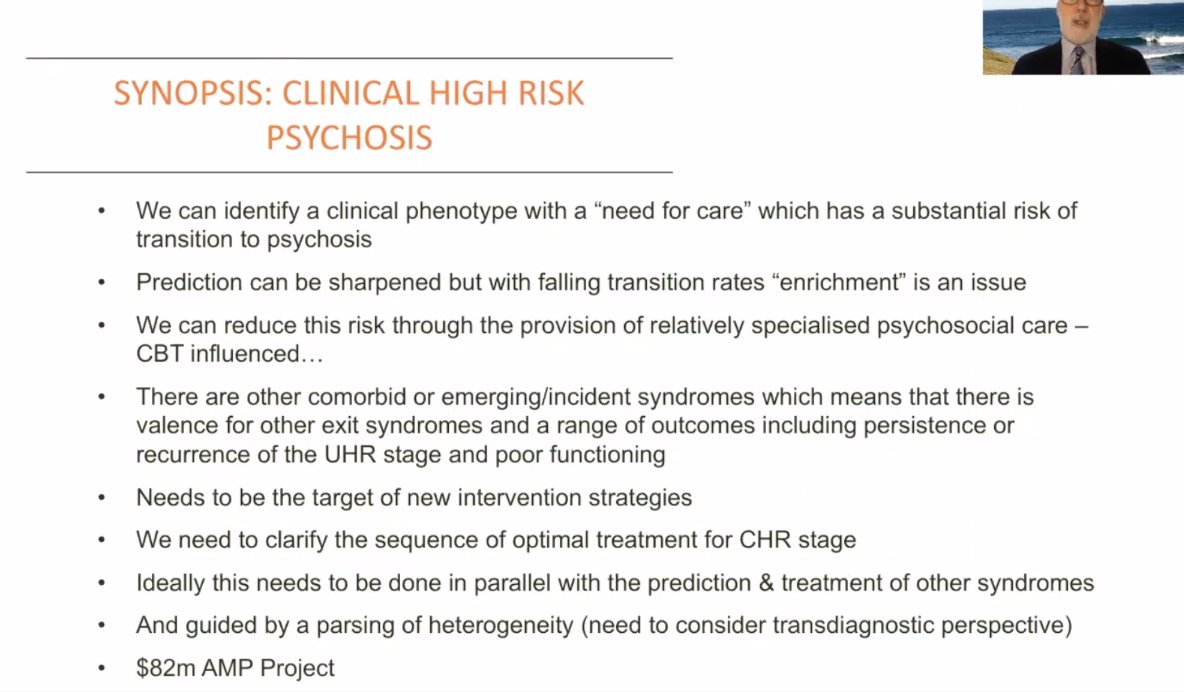
We need to always consider the transdiagnostic perspective, says McGorry. #IEPA12
Outcomes of nontransitioned cases in a sample at ultra-high risk for psychosis, by @lin_ashleigh et al #IEPA12
doi.org/10.1176/appi.a…
doi.org/10.1176/appi.a…
McGorry 2018 World Psychiatry: Beyond the at risk state concept. This is paving the way for the staging model. #IEPA12
ncbi.nlm.nih.gov/pmc/articles/P…
ncbi.nlm.nih.gov/pmc/articles/P…
New transdiagnostic CHARMS paradigm in the context of clinical staging is presented and the importance of following symptoms at early stages is highlighted. #IEPA12
You can read more details on clinical staging in psychiatry in this book published in 2019 #IEPA12
cambridge.org/core/books/cli…
cambridge.org/core/books/cli…
McGorry talks about an editorial on why we need a transdiagnostic staging approach and why the utility of these approaches is important grobally #IEPA12
doi.org/10.1001/jamaps…
doi.org/10.1001/jamaps…
Latest research by Iorfino et al. 2019 on transdiagnostic staging in practice (2019, JAMA-Psych) #IEPA12 doi.org/10.1001/jamaps…
Now McGorry moves on to talk about why treatment delay matters (DUP - duration of untreated psychosis) #IEPA12
Wenche Ten Velden Hegelstad et al (2012) Long-term follow-up of the TIPS early detection in psychosis study: effects on 10-year outcome #IEPA12 doi.org/10.1176/appi.a…
UK waiting time targets have improved outcomes (props to @NormanLamb) #IEPA12 doi.org/10.1002/hec.38…
Now McGorry moves on to talk about the scaling up of early intervention services. Why are we so slow? he asks. Evidence is necessary, but not sufficient #IEPA12
We have really good evidence about the value of these first episode programmes, thanks to Christoph Correll and colleagues #IEPA12 doi.org/10.1001/jamaps…
Why do psychiatrists doubt the value of early intervention? #IEPA12 doi.org/10.1177%2F1039…
“Higher expectations are possible” argues McGorry, but he does accept that better funding of mental health services is vital “across the whole lifespan” to achieve this.
“Higher expectations are possible” argues McGorry, but he does accept that better funding of mental health services is vital “across the whole lifespan” to achieve this.
Implementation fatigue sludge factors
McGorry: we have good evidence that interventions work, but they are not implemented for a variety of reasons #IEPA12
McGorry: we have good evidence that interventions work, but they are not implemented for a variety of reasons #IEPA12
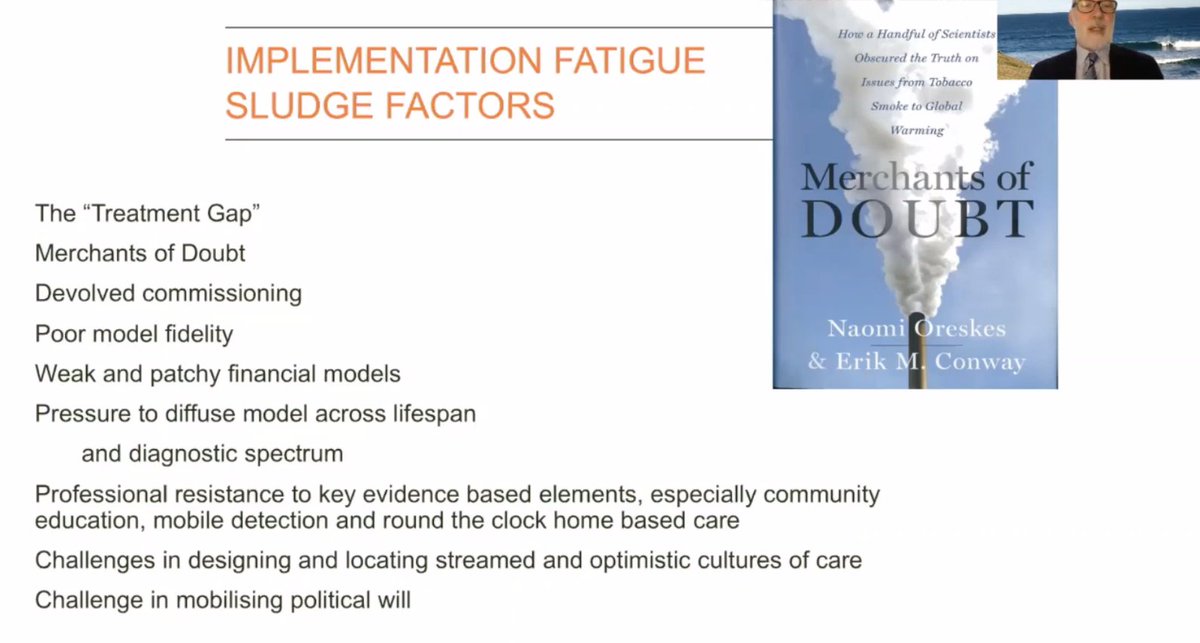
How can we make early intervention more potent? Ideas from Pat McGorry at #IEPA12 
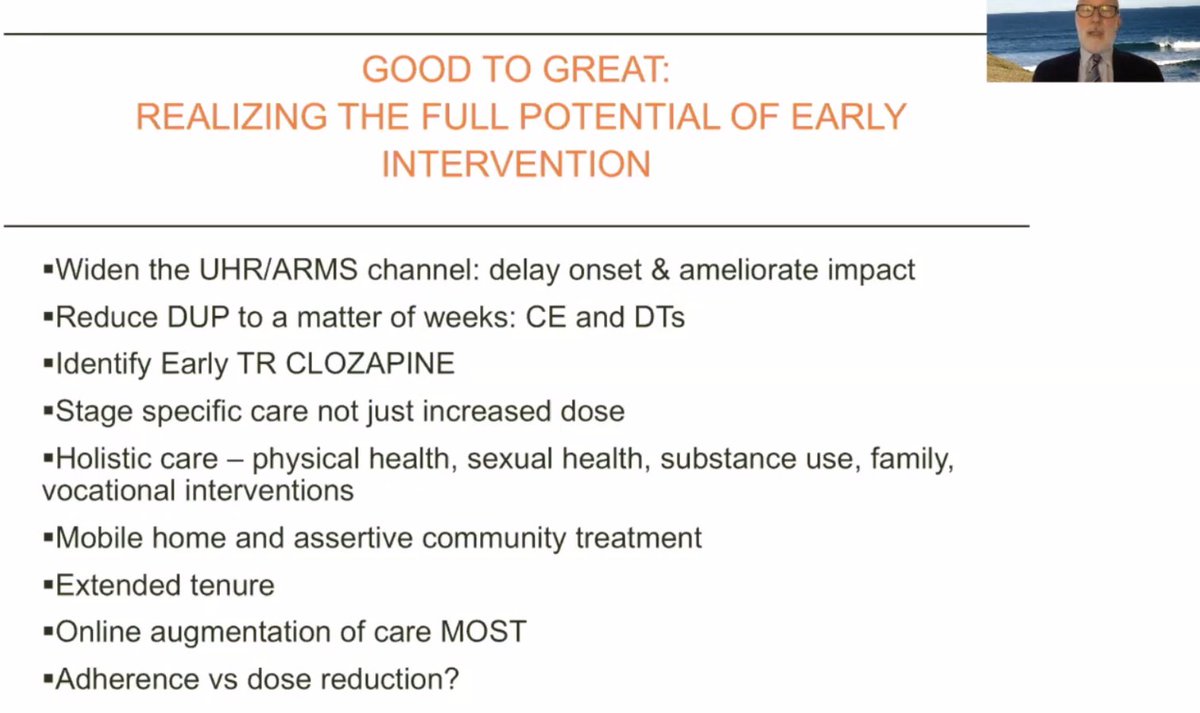
And finally McGorry is going to focus on youth mental health and the transdiagnostic ambition for early intervention #IEPA12
He talks about evidence by Ashok Malla et al. (2016) "From early intervention in psychosis to youth mental health" reform doi.org/10.1007/s00127… #IEPA12
Timing is everything - 75% of mental health problems have their onset in young people aged 12 to 25. Supported by Moffit Caspi 2019 #IEPA12 jamanetwork.com/journals/jamap…
McGorry ends his #IEPA12 talk by citing the Global Framework for Youth Mental Health blueprint published by @orygen_aus and @wef in May 2020: Investing in Future Mental Capital for Individuals, Communities and Economies www3.weforum.org/docs/WEF_Youth…
#IEPA12 Live Q&A with @PatMcGorry. Interesting question from the audience on potential positive impact from the COVID-19 pandemic in terms of early intervention. Certainly, he says, there is a wider effect on population and this plays a role in our fragility of mental health.
McGorry mentions that although certain mental health difficulties have deteriorated (i.e. eating disorders, depression), improving mental health under the shadow of COVID-19 pandemic is still possible. The AUS Gov was preparing for a reform before the pandemic. #IEPA12
'What about social prescribing and social determinants of mental health?'. McGorry says that the approaches we should adopt are always holistic, integrative, multi-disciplinary and social prescribing is a very important factor. However, we need more evidence. #IEPA12
'Why early intervention is focused on more on psychosis rather on depression?' McGorry expresses interest in this question, as these two worlds are inter-connected, but it seems no one has introduced the idea of early intervention in depression. #IEPA12
More academics focus on prevention of depression, rather on intervening early during a first episode of depression. We end up with unmet needs of people with mental health difficulties, he says. #IEPA12
• • •
Missing some Tweet in this thread? You can try to
force a refresh





